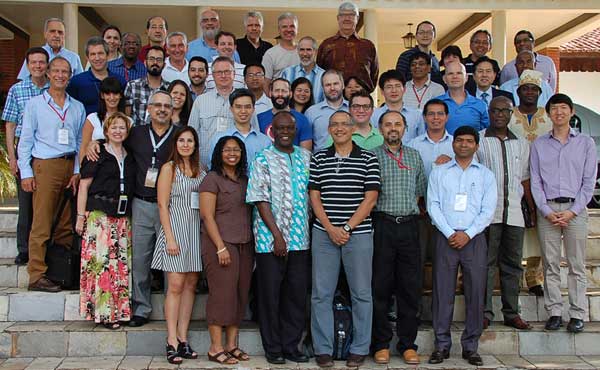Exploring the implications of prosperity theology in the current decade
Also available in: Português | Español

FOR IMMEDIATE RELEASE
Atibaia, Brazil – 10 April 2014 – Some 40 specialists drawn from all continents—leading thinkers, pastors and practitioners—met near São Paulo, Brazil, from 30 March – 2 April for the Lausanne Global Consultation on Prosperity Theology, Poverty and the Gospel. The consultation was hosted by Valdir Steuernagel, a member of the Lausanne Board of Directors, and Marcos Amado, Lausanne International Deputy Director for Latin America.
The consultation was held in fulfilment of The Lausanne Movement’s commitment made in Cape Town in October 2010 to engage major issues facing the church, outlined in The Cape Town Commitment. It also built on work already undertaken by the Lausanne Theology Working Group on the Prosperity Gospel in Akropong, Ghana, from 2008-2009.
It is clear that there is no one single ‘prosperity theology’. Prosperity theologies may be seen in different forms. The present major concerns are the forms which undermine the truth of the gospel, parody the grace of God, and attribute a power to the preacher, which is a travesty of the power of the Holy Spirit at work through the accurate preaching of the Scriptures. The false theology has found widespread appeal in the West. Femi Adeleye, based in Ghana, and Director of Church Partnerships for World Vision International, particularly noted the influence in this area of American televangelists.
It was also recognized, as is made clear in The Cape Town Commitment llE, that God does indeed bless in material ways, and that there can be a true, biblical relationship between his blessing and human prospering.
Contributions in Atibaia examined historical, sociological, cultural, economic, and theological contexts in which prosperity teachings occur. Presentations brought well-researched and perceptive insights. They examined the nature of such contexts and the difficulties created, not least for the biblically illiterate who are unable to calibrate the teaching they hear. While such excesses are more graphic in some places than others, these excesses bring insidious expressions of an inadequate doctrine of creation, of sin, and of grace which pervades the church in many nations.
Each speaker demonstrated a deep knowledge of at least one continent, and plenary discussion drew further insights. The following presentations were delivered:
- A foundational paper (Valdir Steuernagel, Maicon Steuernagel)
- ‘What is Prosperity Theology: A sociological review’ (Paul Freston)
- ‘The New Apostolic Reformation and Prosperity Theology’ (Martin Ocaña)
- ‘Giving for a Return in the Prosperity Gospel and the New Testament’ (David Downs)
- ‘Protestant Work Ethics and Prosperity Theology’ (Paul Miller)
- ‘A Critique of the Way the Bible is Used’ (Femi Adeleye)
- ‘The Search for Balance: Prosperity and Poverty in the Bible’ (Kwabena Asamoah-Gyadu)
- ‘How is Prosperity Theology Penetrating the Theology and Practice of Mainline Churches?’ (Daniel Salinas)
- ‘Ethical Dimensions of Prosperity Theology’ (Vinay Samuel; Joel Edwards)
- ‘Can We Offer a Better Theology?’ (Rosalee Velloso Ewell)
Michael Oh, Executive Director/CEO of The Lausanne Movement, gave the final address from Romans 12, titled ‘Calling the Church to Humility, Integrity and Simplicity’. He ended his session with a call to joyful giving: ‘How are we to give? Toward our financial poverty that many might have spiritual wealth. Leaders cannot shy away from talking about money simply from fears about the abuses of prosperity theology. We need to urge biblical, generous giving—sacrificial giving—or we too will be in error’.
Videos of the presentations will soon be available, and a statement from the consultation will be released later this month. A book bringing together a colloquium on issues raised is envisaged, as well as further resources for equipping the global church to respond to prosperity theology.
END
RELATED LINKS
- Session Videos from the Consultation
- The Cape Town Commitment (Section IIE)
- Akropong Statement on the Prosperity Gospel
- Video: Femi Adeleye: Poverty, Prosperity and the Gospel at Cape Town 2010
BACKGROUND
Lausanne is a global movement that mobilizes evangelical leaders to collaborate for world evangelization. It grew out of the 1974 International Congress on World Evangelization convened in Lausanne, Switzerland, by Rev Billy Graham and Bishop Jack Dain. John Stott was chief architect of The Lausanne Covenant. The Third Lausanne Congress on World Evangelization (October 2010) in Cape Town, South Africa, brought together 4,000 Christian leaders representing 198 countries. The resulting Cape Town Commitment serves as the blueprint for the Movement’s activities.
Lausanne is convening several consultations each year around the issues articulated in The Cape Town Commitment. Currently, a Global Consultation on Islam is being hosted in West Africa. For more information, visit lausanne.org.
CONTACT
For interviews or more information, contact Sarah Chang at media@lausanne.org.
